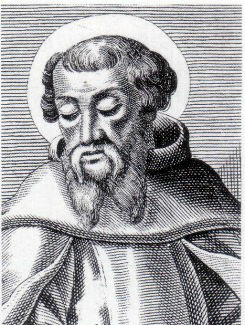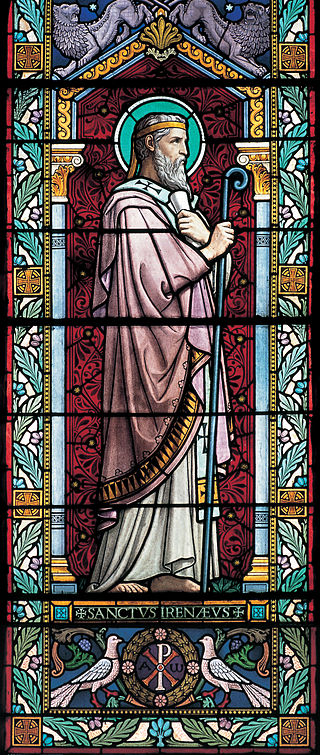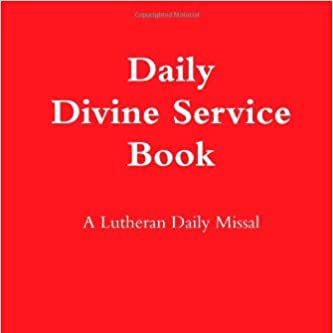The Father of Tradition

St. Irenaeus of Lyons, an early and pivotal early Church theologian, lived and worked in the second century and is best known for his condemnation of heresies and work to establish the tradition and doctrine of early Christianity. He is thought to have been born around the year 125 and hailed from Smyrna. However, he was well-traveled across Christendom, with his studies taking him to Rome and his pastoral responsibilities taking him to Lyons, France.
Irenaeus’s significance also comes from his ties to St. Polycarp, the famous martyr who was said to have studied under John the Evangelist. With Iranaeus’s tutelage under Polycarp, he had a direct connection with the Apostles and received an education handed down from them.
Known as the “Father of Tradition,” St. Irenaeus was a staunch defender of the Christian faith against popular heresies of the time. Around the year 177, his church in Lyons sent him to Rome to assist with theological disputes that had come about due to heretical teaching. While he was away, all the known Christians in Lyons were thrown into prison. After the death of the bishop, Bishop Pothinus, St. Irenaeus was chosen to become the new bishop of the area. He was well loved, and it was said that his preaching transformed the entire town into a “Christian city.”

During and after his trip to Rome, Irenaeus wrote extensively about the heresies that troubled the Church. In the cases of Montanism, Gnosticism, and Valentinianism, Irenaeus defended the faith by highlighting the heretics’ “absurd ideas” and exposing their errors and faulty reasoning. With these and other controversies, Irenaeus was highly influential in guiding the early Church towards a straight and narrow path.
For Irenaeus, the Gospels were the best foundation for fighting the heretics. He asserted that the four Gospels—Matthew, Mark, Luke, and John—were canonical Scripture and, more specifically, attested to the Gospel of John being written by the Apostle and the Gospel of Luke being written by the famous physician, companion of Paul.
This was also the basis upon which he developed his writings. His most famous, Adversus Haereses (“Against Heresies”), was written in 185 and is the first work that cites virtually every book of early Christian writings that we call the New Testament. He also wrote The Demonstration of the Apostolic Preaching.
It is said that Irenaeus won the crown of martyrdom around the year 200 during the tenth year of the reign of Emperor Semptimus Severus. It was then that the emperor issued imperial decrees that allowed pagans to take vengeance on Christians, and in late June assassins in Lyons, armed with daggers, stones, and clubs, roamed the streets and murdered any Christians who refused to participate in their debauchery. This included St. Irenaeus, whom the church has commemorated on June 28th ever since.
A Brief History
As mentioned, Irenaeus was a popular and effective bishop, bringing many to the faith and protecting the early Church from quasi-Christian sects.
His teachings about the traditions of the Church and staunch protection of them from outside influence are still part of our Lutheran teachings today. He is referenced and quoted in the Book of Concord and utilized in our synod’s official documents on the theology and practice of the Lord’s Supper in defending the teaching that there are two parts of the sacrament: one heavenly and one earthly. He also helped solve the issue of when Easter should be celebrated, an issue that concerned the churches of East and West. Irenaeus argued for unity, urging them not to break fellowship with each other.
First and foremost, St. Irenaeus affirmed the teachings of the Scriptures, handed down to and through him as normative for the Church, all the while promoting the oral and written tradition by which he and we have received the scriptural faith. For all of this he is certainly worthy of commemoration among his spiritual descendants today.

Collect
O God, Who didst give Blessed Irenaeus, Thy Martyr and Bishop, to stamp out heresies by the truth of his doctrine and happily to establish peace in the Church: we beseech Thee, give to Thy people, constancy in holy religion, and grant us Thy peace in our days; through Jesus Christ, Thy Son, our Lord, who liveth and reigneth with Thee and the Holy Ghost: ever one God, world without end. Amen.
Lessons
Resources
Issues, Etc. interview with the Rev. Dr. James Bushur on Second Century Bishop of Lyons Irenaeus
Issues, Etc. interview with the Rev. Dr. James Elowsky on Second Century Bishop Irenaeus
Issues, Etc. interview with the Rev. Will Weedon on Second Century Bishop of Lyons Irenaeus
Propers found in Daily Divine Service Book: A Lutheran Daily Missal, edited by the Rev. Heath Curtis
References:
1. Weedon, William C. Celebrating the Saints: The Feasts, Festivals, and Commemorations of Lutheran Service Book.Concordia Publishing House. 2016.
Images:
1. An Engraving of St. Irenaeus, Bishop of Lugdunum in Gaul, Unknown, France, Unknown.
2. Saint Irenee de Lyon (st Irenaeus of Lugdunum) (130-202), Unknown, Germany, Unknown.
3. Saint Irénée , Gérald Gambier, France, 2010.




[…] before the turn of the century. This is where he became connected with other great saints, such as St. Irenaeus, who with his studies under Polycarp kept on the tradition of passing down the faith from one […]